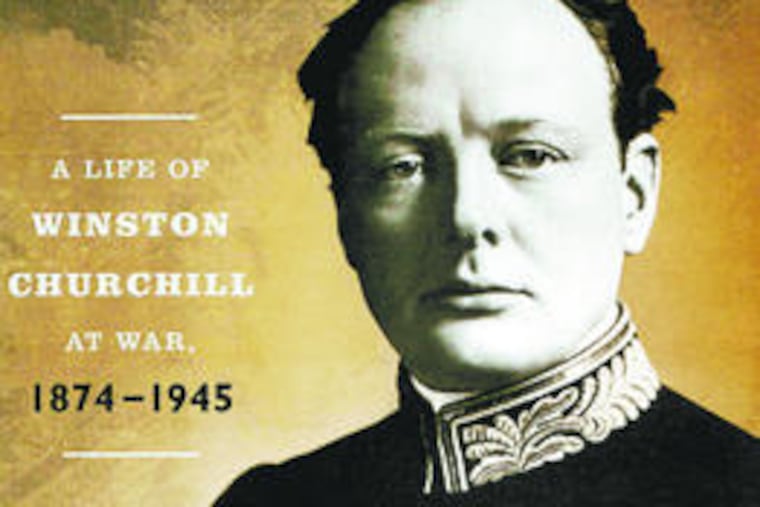Analyzing how the military influenced Churchill
His WWI experiences shaped how he would later lead the British to victory.

A Life of Winston Churchill
at War 1897-1945
By Carlo D'Este.
HarperCollins. 843 pp. $39.95.
Reviewed by John Rossi
The flood of books on Winston Churchill continues. Titles on disparate aspects of Churchill's life and times have appeared, including ones on his sense of humor and his skills as a painter, and even a study using Churchill as a model for how to be a success in business.
Now Carlo D'Este, a retired professional soldier and author of one of the best biographies of Gen. Dwight D. Eisenhower, has turned his attention to what he regards as a neglected aspect of Churchill's career, what he labels "the military Churchill." "Neglected" will come as a surprise to authors such as Martin Gilbert, Richard Holmes and Geoffrey Best, among others, who have written extensively about Churchill the military man.
Seeking to fill the void on Churchill's military experiences, D'Este devotes 300 pages of his book to Churchill's career before World War II, arguing that "it was the military Churchill who made possible the political Churchill." D'Este believes Churchill's experience of colonial conflicts in the Sudan and during the Boer War taught him valuable lessons about the nature of warfare. World War I completed his military education and ended any romantic notions Churchill had about modern warfare.
From these conflicts Churchill drew certain observations. He never forgot the bloodletting in the trenches, where he served himself for a few months in 1916. D'Este shows that Churchill observed how the military brass controlled the political leadership, a lesson he never forgot.
More significant for his later career, Churchill came to distrust the advice of military experts. He believed that a political leader, not the military elite, "must establish strategic policy" in any future war.
The last half and best part of D'Este's book concentrates on Churchill's role in World War II. Again, much has been written about this topic, including Churchill's own six-volume history on the war. D'Este's study, while adding little that is new on Churchill's role in the Second World War, nonetheless tells the story clearly and concisely.
In the face of disaster after disaster in the early stages of the war - the Norwegian campaign, the fall of France, the failed intervention in Greece - D'Este calls Churchill's tenacity the defining feature of his leadership. Many of these blunders D'Este attributes to Churchill's love for the unorthodox in military planning. He was always open to a new idea, the more outlandish the better, a source of strength and a problem for his military advisers.
Churchill had his flaws as a military thinker: He never understood logistics, believing that character and willpower could overcome logistical problems. He often wasn't the best judge of his military advisers, underrating Hugh Dowding, who won the Battle of Britain, for instance, and failing to appreciate the talents of his commander in Egypt, Gen. Archibald Wavell.
One of Churchill's greatest strengths, according to D'Este, was the team that he put together in the early stages of the war: Gen. Bernard Montgomery, Gen. Harold Alexander, and especially Gen. Alan Brooke, the British chief of staff, who fought to control Churchill's wildest notions but who came to appreciate his ability to inspire the Allied cause.
Once Britain had survived its isolation, and when the Soviet Union and the United States joined the war in 1941, Churchill sought to limit British casualties. He favored war on the periphery, especially in the Mediterranean, the theater D'Este shows most engaged his attention. Churchill's Mediterranean strategy was aimed at knocking Italy from the war and attacking Germany through what Churchill called its "soft underbelly." He wanted to avoid the huge losses that would follow any frontal attack on Germany. To avoid direct conflict with Germany, Churchill favored strategic bombing. D'Este quotes Churchill as saying that "the Navy can lose us the war, but only the air force can win it."
Churchill sought to impose his strategic vision on the Americans, but had limited success as the war progressed. His relationship with Eisenhower, which D'Este traces in some of the best parts of his book, was close. But Churchill was unable to convert Eisenhower to his conception of how the war should be fought. They disagreed about the conduct of the Italian campaign and the landings in southern France after D-Day, among other things. Eisenhower prevailed on these issues.
D'Este argues that from mid-1944 on Churchill recognized that his power to control events was declining as American numbers began to prevail in the European theater. Churchill lost his enthusiasm for the war, and in its last year his powers followed what D'Este describes a "downward spiral."
D'Este's book is not an original interpretation of Churchill's career or even of his military thinking. But it is well written and tells the story of one of the most remarkable figures of the 20th century. It is a good addition to anyone's library of books on Churchill or World War II.